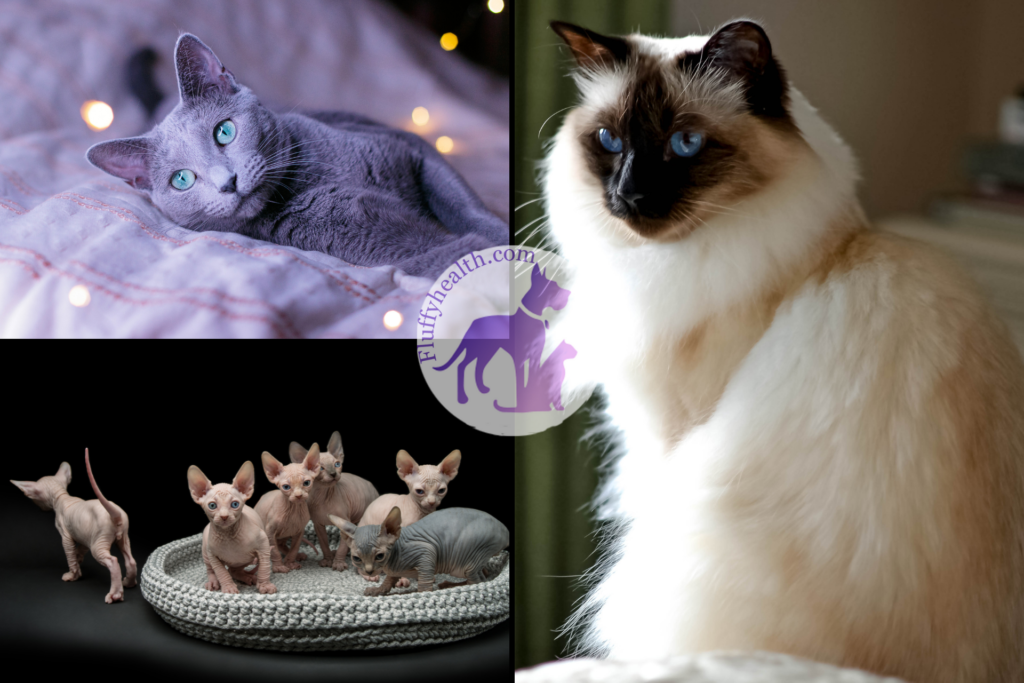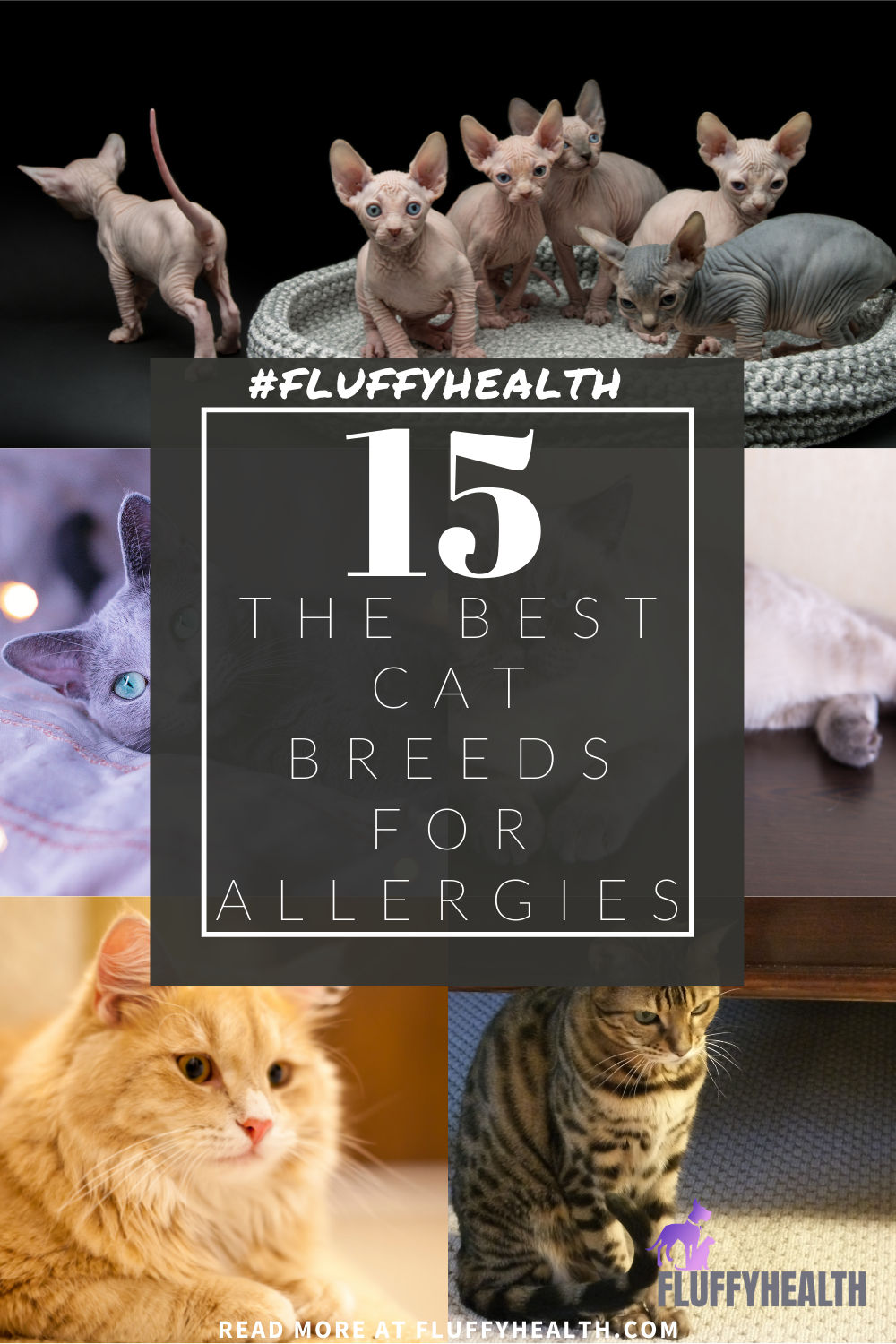Are you allergic to cats? Don’t worry! In today’s article, we will find the best cat breeds for allergies for you. However, if you love cats, you are probably hoping to find a cat that you can live comfortably with.
While people with asthma and feline allergies should really avoid cats altogether, it is possible that someone with minor cat allergies can find a suitable feline companion.
We invite you to learn about hypoallergenic cat breeds and thus perhaps find your dream companion! If you want to stop sneezing at the sight of an adorable feline, continue reading our article, top hypoallergenic cat breeds!
Hypoallergenic Cats
Let’s start by clarifying that an allergic reaction is absolutely not due to the feline’s hair. In fact, allergies are caused by proteins Fel D1 and Fel D4. These so-called proteins are deposited subtly on the cat’s coat once its toilet is finished and can be distributed throughout the house as the cat loses its hair.
Likewise, the feline also expels the Fel D1 protein through its urine, making cleaning its crate a real ordeal for a severely allergic person. However, if you are really allergic, we provide you a list of the best cat breeds for allergies to choose from.

7 Tips To Minimize Your Allergies To Cats
If you live with a cat who triggers your allergy attacks and you would like to know some tips and tricks that would reduce your body’s immune response to the Fel D1 protein, we invite you to continue reading this paragraph!
Although the situation is not ideal, you should know that you can very well minimize your allergic reactions by following these few tips. These said recommendations are also made for allergic people thinking of adopting a hypoallergenic cat. Here they are :
- Keep your bedroom door closed. You will have to do your utmost to prevent your cat from entering your room.
- Wash your hands after each contact with the cat.
- Clean the rugs! Rugs and carpets are an actual allergen shed! Remember that if your cat loses its fur loaded with Fel D1 protein, the carpets will become actual nests for the protein that causes you red eyes and uncontrollable and often uncontrolled sneezing!
- Ensure someone brushes the cat regularly to prevent it from shedding much hair and allergens from getting all over the house!
- Since cats also expel this protein through their urine, make sure their crates are always clean! Above all, avoid handling it yourself!
- Neutered cats produce fewer allergens, so if yours still hasn’t had this operation, don’t hesitate to talk to your vet for a second!
- Install an air purifier with a High-Efficiency Particulate Air (HEPA) filter, that is to say, a high-efficiency air particle filter.
The 15 Best Cat Breeds For Allergies
Finding the best pet to be your companion is the best thing in life. After all, pets are known to help make our life healthier and happier. As a cat owner, I can’t imagine my life without a cat, and I believe you want to be the next cat owner since reading this article.
Don’t worry! We are here to help you choose your feline friend. However, make sure to talk to your doctor before deciding to bring a cat into your house, and you can also contact a vet to help you with this decision. Without any delays, let’s start with the first obvious breed on our list!
#1 The First Best Cat Breeds For Allergies Is The Sphynx Cats

The medium to large-sized Sphynx cat is what probably comes to your mind when you think of the best cat breeds for allergies, as they appear to be completely hairless and are among the top hairless cat breeds.
Sphynxes are actually covered with a fine down coat that you can’t see or really smell. Their visible skin usually wrinkles around the shoulders, ears, and muzzle, and they are also known for their vast, satellite-like ears.
Furthermore, the Sphynx is dedicated, friendly, and affectionate, which means this isn’t a cat you could leave at home while you’re at work all day. They are curious and very intelligent, getting them in trouble (they are often prone to playful behavior).
Moreover, they get along well with other animals. It’s better to keep this breed as domestic cats because, like us, they can get sunburned if you left them outside for a long time. They also need a bath about once a week to keep their skin healthy.
#2 The Siberian Cats

The second best cat breeds for allergies is the Siberian cat. Although the Siberian cat is characterized by its dense and long coat (which could make us believe that it is a cat with more probabilities of accumulating allergens), it should be known that it is considered the best cat breeds for allergies.
In the world of cats, this incredible characteristic is due to the fact that it is the cat that produces the least Fel D1 protein. However, adopting a Siberian cat does not guarantee you 100% that the allergic reactions will disappear completely. The amount produced of the Fel D1 protein can be tolerated very well by some people. And completely unbearable for others.
#3 The Bengal Cats

Bengal is a very popular cat breed. Indeed, it is not only gorgeous, but it is also hypoallergenic. In addition, its highly recognizable spotted coat only requires monthly brushing to stay healthy. The Bengal cat breed inherited it from the Bengal leopard cat, a wild feline that can be tamed without significant challenge.
Also, like their ancestors, Bengal cats love to climb trees and are one of the few cat breeds who love swimming. Bengal cats are also brilliant and can be trained like dogs: for example, it is pretty easy to teach them to bring back objects.
#4 The Russian Blue Cats

Thanks to its coat formed of a double layer, the Russian Blue is considered one of the best cat breeds for allergies because its production of Fel D1 is reduced and because its double-layer keeps this protein as close as possible to his skin. So, we could almost say that in addition to secreting less Fel D1 protein, it hardly spreads it in your house!
#5 The Javanese Cats

The parent breeds of the Javanese are the Siamese, the Shorthaired Colorpoint, and the Balinese, which means they are lean and athletic, intelligent, playful, and incredibly affectionate. They have a mid-length coat and come in a variety of colors, but the feature that truly makes them stand out is their bright blue eyes.
Moreover, Javanese cats are so active and intelligent that you won’t have a moment of peace and quiet once you let this cat into your home. So if you dare to get a Javanese, you have been warned.
But, on the other hand, they can easily be trained to play fetch or do tricks, and they usually keep their silky coats very clean (which means they rarely, if ever, need a bath).
#6 The Balinese Cats

As is the case for the Siberian, the Balinese, despite his coat provided, produces less Fel D1 protein than the rest of the cat breeds that we will discuss in the rest of this article of the best cat breeds for allergies.
And as you have most likely understood, the fact that it produces less Fel D1 protein makes it a perfect cat for some people with allergies. Also known as the long-haired Siamese, it does not need much care to keep its magnificent coat in good condition.
However, it will still need to be brushed two to three times a week to avoid the formation of knots.
Additionally, his friendly, playful, and loyal character makes the Balinese the ideal companion if you want to spend long hours with your feline. The Balinese do not tolerate loneliness well and prefer to be in the company of their favorite human (you!).
#7 The Devon Rex Cats

The Devon Rex is a cousin of the Cornish Rex, to whom he looks a lot like. It also has the same hypoallergenic characteristics as it loses little of its hair and produces few allergens. The winning combo for a sensitive master!
A playful and cuddly cat sometimes behaves like a dog, bringing back toys and wagging his tail when happy. However, Devon Rex cats do not like to be alone for long and fear the cold. Therefore, it is rather suited to living in an apartment, like his cousin.
#8 The Colorpoint Shorthair Cats

Colorpoint shorthair is related to Siamese cats, so much so that they look almost exactly like them. Shorthaired Colorpoint cats are more colorful than Siamese. But they are also identical to Siamese in terms of personality. They are both talkative, sympathetic and susceptible to human emotions. So, for example, if you cried during a sad movie, Colorpoint would try to comfort you.
Moreover, they hardly require grooming or bathing. However, if you wanted to, you could occasionally brush them to remove loose hair.
#9 The Ocicat Cats

The Ocicat is a recent breed of cats, created in the 60s in the United States by marrying an Abyssinian and a Siamese. It has short and resistant hairs that do not fall much. Therefore, they disseminate less allergenic proteins.
Like its two parents, this cat breed does not tolerate loneliness and prefers to spend time with their owner than alone in the garden. However, it is less talkative and intrusive than them.
#10 The Siamese Cats

The Siamese cats are one of the best known and oldest breeds of cats that originated in Siam in the 1800s, known nowadays as Thailand. They are often distinguished by their color with black or brown dots, although the Siamese can come in a few different color combinations.
Also, their short, thin coat makes them easy to keep when it comes to grooming, but their energetic and affectionate nature makes them demand a lot of attention.
Nevertheless, the Siamese is known as one of the most talkative cats, and if left alone for too long, they will feel lonely and sad. But if you have enough time to spend with a Siamese, he will quickly become your best friend.
#11 The Korat Cats

The Korat, considered one of the best cat breeds for allergies, is a medium-sized cat with a robust character. In addition, its blue fur is devoid of an undercoat, which is the part of the coat that renews itself the most. This, therefore, limits the dissemination of hair and allergens in the house.
In addition, it is a very playful cat who enjoys the company of humans and knows how to be patient with children. As it is also intelligent and adaptable, it is not difficult to teach this cat a few tricks, as one would with a dog.
#12 The LaPerm Cats

The LaPerm cat gets its name from its curly or wavy coat, ranging from loose curls to tight corkscrews. Thanks to its unique curls, its hair falls out less than other breeds, making it the best cat breeds for allergies.
Nevertheless, LaPerms like to be around people and are very curious. They will often want to stay on your lap for as long as possible and will even touch your face with their paws.
#13 The Short-Haired Oriental Cats

There are two types of Oriental cats. The Shorthaired Oriental has a short, satin coat that sits close to its body. The breed has over 300 colors and patterns, and it sheds very little hair and requires minimal grooming. There are also long-haired Orientals who, as their name suggests, have a long, silky coat that still requires little maintenance.
Furthermore, Orientals are known for their intelligence, loyalty, and they are one of the breeds that need your attention which means they are not the cat breed for you if you want a cat that can be left home alone during work hours. Moreover, Orientals need regular entertainment or at least another cat to play with and hang out with. We even go so far as to say that Orientals think “the world should revolve around them.“
#14 The Cornish Rex Cats

The Cornish Rex is an energetic, amazingly agile, and affectionate race. They are one of the best cat breeds for allergies as they shed very little hair and only have one undercoat, called Down. They are smaller cats, with males usually weighing 6-9 pounds and females 5-7 pounds.
Additionally, the Cornish Rex cats don’t like to be alone for long times. When feeling lonely or being ignored, they may have problems getting your attention. Nonetheless, the Cornish Rex is an excellent cat for an active family or someone who likes to give their pets a lot of affection.
#15 The Selkirk Rex Cats

While the Cornish Rex and Devon Rex are generally high-energy cats, the Selkirk Rex is much more laid back. Similar to other Rex cats, this race also has a wavy coat that drops little. Brushing at least twice a week is great for removing dead hair and tangles, as well as limiting its ability to spread allergens.

